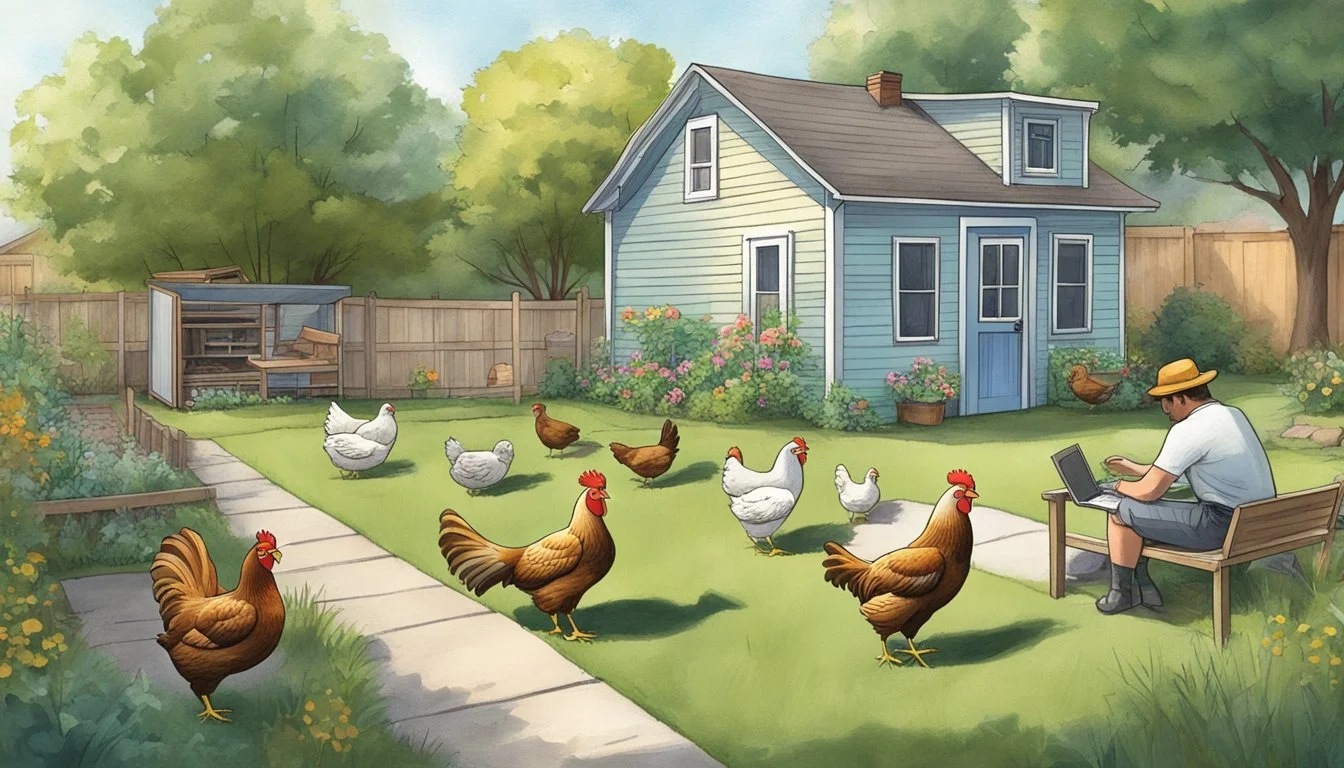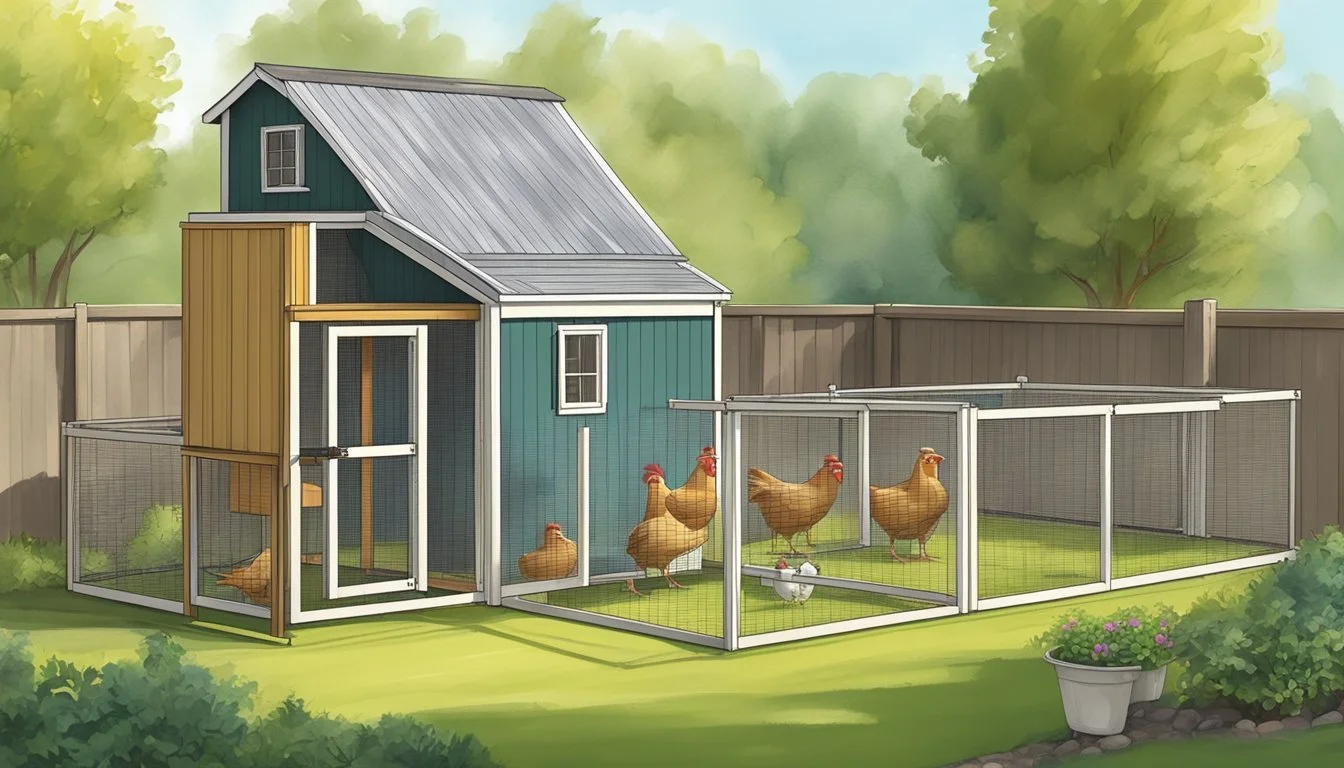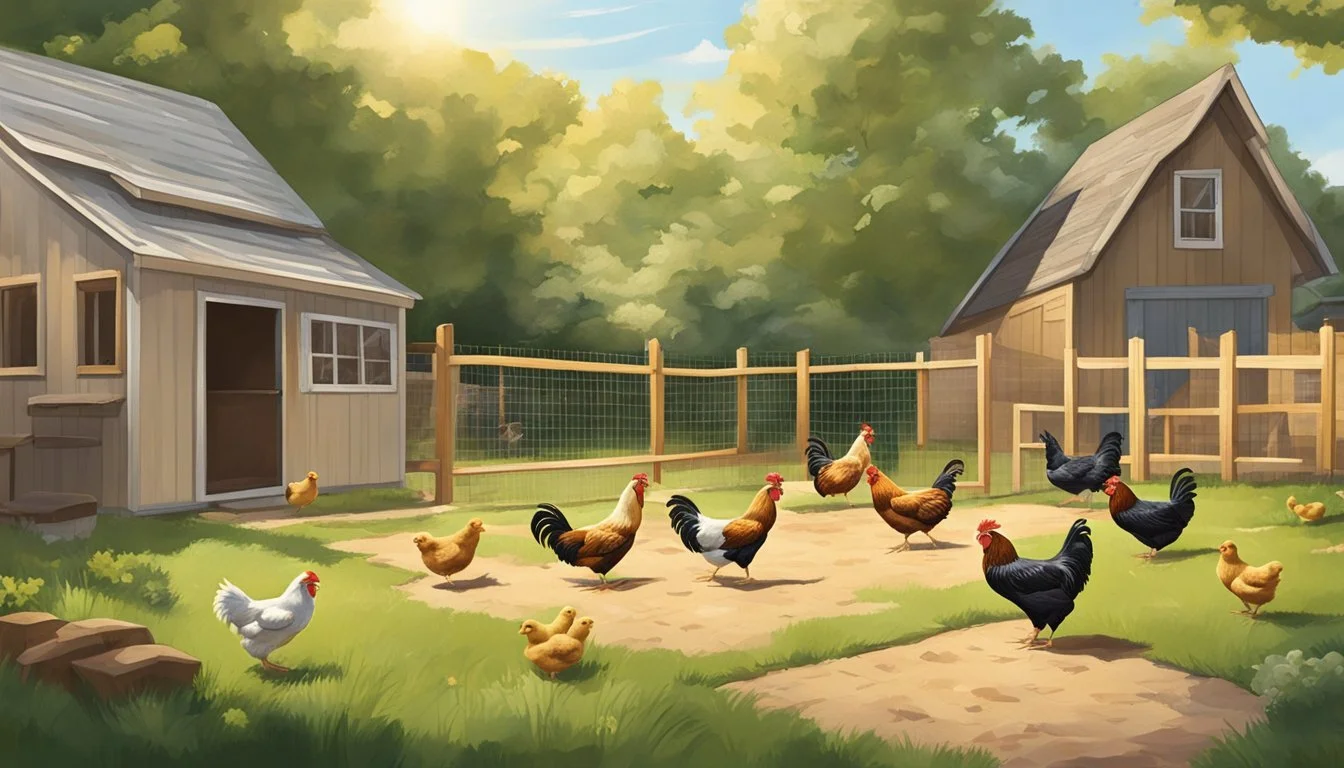Raising Backyard Chickens in Lawrence, KS
A Beginner's Guide
Raising backyard chickens in Lawrence, Kansas is an activity that combines the charm of rural living with the convenience of urban life. As the interest in sustainable living and local food sources grows, residents of Lawrence have embraced the practice of keeping chickens in their backyards. This trend is supported by local laws that have been designed to balance the benefits of urban agriculture with the need to maintain harmony in densely populated neighborhoods.
The city of Lawrence allows its residents to keep a maximum of 20 chickens, provided the lot size is sufficient to ensure proper space for each bird. The commitment to animal welfare and neighborly consideration is reflected in ordinances stipulating minimum space requirements. For each chicken or duck, a coop must have at least 2 square feet if an outdoor run is available, or 10 square feet per bird if there is no outdoor run. Furthermore, laying boxes must offer a minimum of one square foot of space per hen to ensure comfort for laying eggs.
A notable aspect of these regulations is the restriction on roosters within city limits, a measure designed to minimize noise disruptions. This ensures that while residents can enjoy the benefits of fresh eggs and the experience of raising chickens, the peace of the community remains undisturbed. For those interested in the practice, these guidelines serve as a starting point to ensure that raising backyard chickens in Lawrence is both a rewarding hobby and a positive contribution to the community's well-being.
Understanding Local Ordinances and Regulations
Before embarking on the journey of raising backyard chickens in Lawrence, KS, it is imperative for residents to familiarize themselves with local ordinances and regulations to ensure they remain in compliance.
Lawrence Chicken Ordinance Compliance
In Lawrence, KS, individuals are allowed to keep chickens, but they must adhere to specific space requirements. For each chicken, there must be a minimum of 2 square feet of coop space if they have access to a fenced outdoor run. If there is no run, 10 square feet per chicken is required. Additionally, every laying hen must have access to at least 1 square foot of laying box space.
Permit and Property Requirements
Residents wishing to raise chickens in Lawrence do not need a special permit. However, coops should meet certain standards:
Easy to clean
Each chicken should have a minimum of 3 square feet of space inside the coop and 10 square feet in the run. Local government or homeowners' associations (HOAs) may impose additional property restrictions or regulations, so it is important to consult with them. Checking with local government officials can provide clarification on any zoning restrictions that may apply.
Choosing the Right Chicken Breeds
In Lawrence, KS, selecting appropriate chicken breeds for a backyard flock requires consideration of their purpose, size, and adaptability to regional climates.
Egg Laying vs. Meat Breeds
When choosing breeds, one of the primary decisions is whether egg production or meat is the goal. For prolific egg layers, Lohmann Browns stand out as they can lay over 300 eggs annually. If meat production is the aim, breeds such as the Cornish Cross are specifically raised for their rapid growth and substantial body mass. However, dual-purpose breeds like Sussex can provide a balance between egg laying and meat production, making them a versatile choice for backyard flocks.
Bantam or Standard Size Selection
Chicken size is a significant factor affecting space requirements and flock management. Bantam breeds, known for their smaller size, require less space and can be an ideal choice for those with limited backyard area. They typically need half the space of standard breeds. In contrast, standard-size fowl such as the Ameraucana, recommended for Kansas residents due to their adaptability, require more space – approximately 4 square feet per bird in the coop and 10 square feet in the run.
Heritage Breeds and Adaptability
Heritage breeds, like the Araucana, are notable for their hardiness and ability to adapt to local climates. They can be particularly suitable for the weather extremes in Kansas. Heritage breeds often have a longer lifespan and better disease resistance when compared to commercial hybrids. However, it is essential to match the chicken breed to Lawrence's climate; for instance, Andalusians are well-suited for hot areas but may suffer frostbite in cold weather, indicating that they may not be the best choice for this region.
Setting Up Your Chicken Coop
When establishing a chicken coop in Lawrence, KS, residents should prioritize a design that allows for sufficient space, ventilation and security. It is crucial to create an environment that is not only comfortable for the chickens but also functional for the caretaker.
Coop Design and Size Considerations
The size of the chicken coop should accommodate at least 3 square feet of floor space per chicken inside the coop and a minimum of 10 square feet in the run area for outdoor access. Overcrowding can be detrimental to the chickens' health and well-being. One should opt for a coop design that simplifies both cleaning and expansion should the flock size increase in the future.
Proper Ventilation and Lighting
Ventilation is vital to maintain air quality and the health of the flock. A coop should have ventilation holes near the top to allow hot air to escape and prevent moisture buildup. In terms of lighting, windows can provide natural light, which is beneficial for the chickens' laying cycles. Windows should be covered with secure mesh to keep predators out.
Security Against Predators
Security features are paramount. A sturdy coop with strong fencing can protect chickens from common predators. All openings should be covered with predator-proof wire, and doors must be lockable. Additional measures like buried wire can deter digging predators.
Nesting Boxes and Roosting Spaces
Each chicken requires a nesting box where they can lay eggs in privacy. Recommended dimensions for these boxes are approximately 12"x12"x12". A layer of soft bedding, such as straw or wood shavings, helps absorb moisture and keeps eggs clean. Additionally, roosting spaces should be provided for each bird to sleep off the ground, with a design that allows for easy cleaning beneath the roosts.
Caring for Chicks and Adult Chickens
Raising backyard chickens in Lawrence, KS, requires careful attention to their environment and dietary needs from the chick stage through adulthood.
Brooder Setup for Baby Chicks
The first step in raising chickens is to establish a brooder, a warm and safe environment for baby chicks. The brooder should have sufficient space for the chicks to move around and must be equipped with a heat lamp to maintain a consistent temperature. A thermometer is vital to monitor the brooder's temperature, which should start at 95°F for the first week and decrease by 5°F each week until the chicks are accustomed to the outside temperatures.
Nutritional Requirements and Feeders
Chicks require a diet high in protein to support their rapid growth. During the first 8 weeks, they should be fed an 18-20% protein starter feed. As they transition from baby chicks to juveniles, their diet should change to a 16-18% protein starter/grower feed until about 14 weeks of age. Feeders should allow easy access to food while minimizing waste and contamination.
Age Range Protein Content Feed Type 0-8 weeks 18-20% Starter Crumbles 8-14 weeks 16-18% Starter/Grower 15-18 weeks 16% Finisher
Health Checks and Access to Vet Care
Chickens should be regularly observed for signs of illness, such as lethargy or changes in eating habits. Access to a local vet familiar with poultry is crucial, especially to address common conditions like pasty butt in chicks, which can block the vent and be life-threatening. Quick intervention is key, and owners must stay informed on how to detect and treat health issues in their flock.
Temperature Control and Shade
Adult chickens can regulate their body temperature more effectively but still require protection from extreme weather. In the heat of Lawrence, KS, providing shade is essential, along with cool, clean water to prevent overheating. During colder months, ensuring coops are draft-free without overheating is important for their health, as chickens can tolerate cold better than excessive warmth.
Day-to-Day Management and Maintenance
Proper day-to-day management ensures the health and productivity of backyard chickens. This routine involves maintaining a clean environment, providing consistent nutrition and water, and monitoring the flock's health, all while integrating chickens into a garden ecosystem for optimal benefit.
Daily Feeding and Watering Routines
Chickens require a consistent supply of fresh food and water. Feeders should be filled daily with a balanced diet specific to the chicken's age and production type, such as layer pellets for laying hens. Waterers need to clean refills each day to prevent the spread of disease and ensure hydration.
Feeding: Specific to each chicken type
Watering: Fresh, clean daily
Regular Cleaning and Waste Disposal
Coops must be kept clean to prevent disease. A weekly cleaning routine includes replacing bedding and removing droppings. Manure can be composted and later used as a powerful fertilizer in the garden.
Bedding Replacement: Weekly
Manure Disposal: Compost for garden fertilizer
Monitoring for Illness and Stress
They should closely watch chickens for signs of illness or stress. Common indicators include changes in eating habits, lethargy, or abnormal droppings. Immediate remedial action helps maintain a sanitary environment and the well-being of the flock.
Observation: Daily, for signs of distress
Action: Prompt, to address potential issues
Garden Integration and Pest Control
Integrating chickens into a garden can control pests and contribute to soil health. They can also act as tillers and help aerate the soil. However, garden plants should be protected from digging and pecking.
Pest Control: Natural, through chicken foraging
Soil Health: Improvement through aeration and fertilization
Maintaining a balance between the needs of the chickens and the garden is essential for creating a productive backyard ecosystem. Regular routines and a clean, healthy environment are crucial for the success of raising backyard chickens in Lawrence, KS.
Leveraging Chicken Contributions
Raising chickens in one's backyard goes beyond the joy of keeping them; it offers tangible benefits, especially through their eggs, manure, and potential for meat.
Egg Harvesting and Usage
Every laying hen in Lawrence, KS, produces a substantial amount of fresh eggs, contributing significantly to the household's pantry. It's essential for residents to provide at least one square foot of laying box space per hen to optimize egg production. They can expect to collect eggs regularly from their coop, which can either be consumed fresh or used in various culinary preparations, reducing the need for store-bought eggs.
Chicken-Generated Fertilizer
Chickens are prolific producers of fertilizer, enhancing garden soil fertility and promoting healthier plant growth. Their manure can be composed to create high-nitrogen fertilizer:
Collect and pile chicken manure.
Allow it to compost to kill pathogens.
Mix with garden soil at a ratio of 1:3 for optimal results.
This practice supports a sustainable loop of food production and waste management within a backyard setting.
Slaughtering Guidelines for Personal Consumption
For those considering raising chickens for meat in Lawrence, KS, it is imperative to follow local slaughtering regulations, ensuring humane practices. Detailed guidelines usually address:
Slaughter age: typically, when chickens reach a certain weight or age.
Processing area: a clean, designated space away from the living area of other chickens.
Sanitation: proper sanitization of equipment and hands to prevent the spread of disease.
Adhering to these guidelines guarantees that the process respects both the animal and the health standards of the community.
Community and Neighborhood Relations
Raising backyard chickens in Lawrence, KS requires awareness of community dynamics. Maintaining positive relationships with neighbors and adhering to local ordinances can lead to a harmonious environment for both residents and chickens.
Engaging with the Local Chicken Keeping Community
A resident interested in raising chickens should connect with Lawrence's local chicken keeping community. This can provide access to resources, advice, and support vital for responsible chicken keeping. There are likely informal networks or groups that someone can join to share experiences and best practices within the community. These allow chicken owners to stay informed about any changes in city regulations that impact their backyard flock.
Handling Concerns from Neighbors
When neighbors have concerns about one's backyard chickens, it's crucial to address them promptly and diplomatically. Ensuring chickens are not a nuisance involves:
Noise management: Since roosters are prohibited within Lawrence city limits to minimize noise disturbances, only hens should be kept.
Odor control: Regular cleaning of the coop and proper waste disposal can prevent unpleasant smells.
Predator protection: Securely enclosing chickens protects them and prevents them from wandering into neighbor's properties.
Communicating with neighbors and being open to resolving their concerns demonstrates a commitment to community harmony.
Responsible Keeping and Shared Spaces
Responsible chicken keeping ensures that both the animals and community members are safe and happy. The following practices are important in shared community spaces:
Coop requirements:
Minimum 2 square feet of coop space per chicken if an outdoor run is provided.
Minimum 10 square feet of coop space per chicken if an outdoor run is not provided.
Hygiene: Maintaining a clean and sanitary coop reduces the risk of disease and pests.
Compliance: Familiarity with Lawrence's animal control and local ordinances ensures responsible ownership and avoids conflicts.
By considering the well-being of the chickens, the owners, and the community, raising backyard chickens in Lawrence can be a positive experience for all involved.
Long-term Considerations and Best Practices
When one commits to raising backyard chickens, they must consider not just the immediate needs of their poultry but also plan for the long-term sustainability and growth of their flock. The tools used, housing provided, and knowledge acquired all contribute to the success and expansion of this endeavor.
Planning for Longevity and Expansion
When starting with backyard chickens in Lawrence, KS, planning for longevity and expansion is crucial. One should consider lot size and local zoning regulations that may impact the number of chickens allowed. Initially, beginners might opt for a smaller coop, but they should ensure that it can be scaled up or that there's room for additional housing as the flock grows.
Lot Size Considerations: Review Lawrence's zoning laws to ascertain restrictions on coop size and flock number relative to your lot size.
Housing: Sturdy and spacious housing is essential, with considerations for easy cleaning, ventilation, and predator protection.
Best Practices for Seasonal Adjustments
Chickens are affected by seasonal changes and require different management practices throughout the year. In Lawrence, KS, where temperatures can vary widely, owners need to make seasonal adjustments for the health of their birds.
Summer: Ensure coops provide ample shade and ventilation to protect chickens from heat stress.
Winter: Insulate housing to retain warmth and prevent water sources from freezing, but maintain proper ventilation to avoid moisture buildup.
Continuous Learning and Improvement
The process of raising backyard chickens is one of continuous learning and improvement. Staying updated with the latest best practices through reading, participating in local agriculture programs, or joining poultry associations can provide valuable insights for both beginners and experienced chicken owners.
Tools: Invest in durable and efficient tools that support the care and maintenance of your flock.
Knowledge: Engage with the chicken-raising community in rural areas and online for a steady exchange of information.
Adhering to these long-term considerations and best practices, they can maintain a thriving and sustainable backyard chicken presence in Lawrence, KS.










